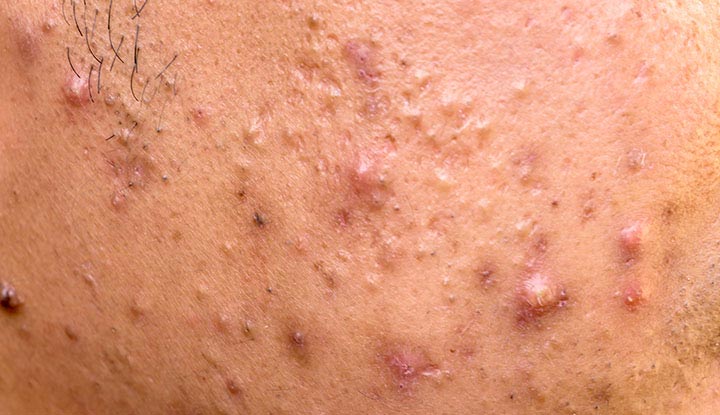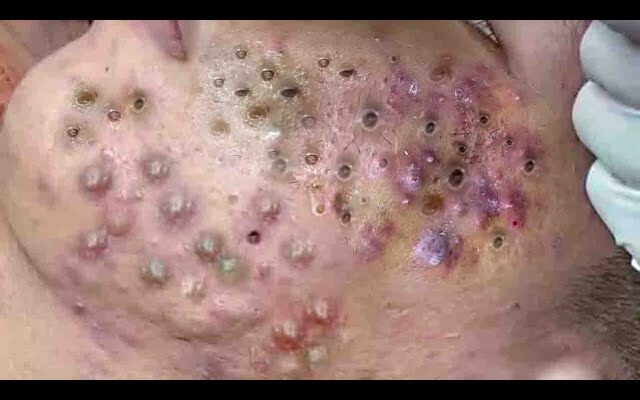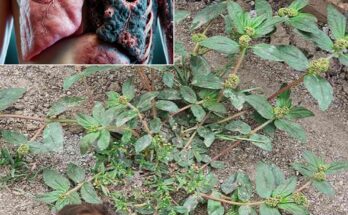Acne papules are small, inflamed bumps caused by excess oil in your skin, bacteria, hormones and some medications. They don’t have a pus-filled tip like other forms of acne. Treatments include over-the-counter and prescription medications.
Overview

What are acne papules?
Acne papules are solid, inflamed bumps in your skin that are usually cone-shaped (conical). They don’t have a white or yellow pus-filled tip. They’re usually smaller than one centimeter (cm), and they may be the same color as your skin or red, brown or purple.
Who do acne papules affect?
Papules typically affect teenagers (adolescents) and young adults undergoing hormonal changes. But many adults continue having papules into their 20s, 30s and beyond. Some even develop papules for the first time as adults.
How common are acne papules?
Acne papules are very common. Some researchers suggest that acne papules affect nearly everyone at some time during their lives. They’re most common during adolescence, but adults may have them, too.
How do acne papules affect my body?
Your face (especially your nose, chin and forehead), neck, back, chest, shoulders and upper arms are most likely to develop papules. But they may appear on other parts of your body, as well.
Symptoms and Causes
What are the symptoms of acne papules?
Papules are an inflammatory form of acne. They don’t have a pus-filled tip, but they’re still noticeable. They may be red, tender, painful or irritating.
What causes acne papules?
Acne papules have many causes:
- Your oil (sebaceous) glands produce too much oil.
- An increased presence of bacteria on your skin.
- An increased presence of androgens, which are a group of sex hormones. They help start puberty and play a role in reproductive health and body development. All people have androgens, but people assigned male at birth (AMAB) make more of them. Testosterone is the most common androgen.
- Some medications, including corticosteroids and anabolic steroids.
Are acne papules contagious?
Papules aren’t contagious. You can’t spread them to another person through skin-to-skin contact.
Diagnosis and Tests
How are acne papules diagnosed?
Acne papules are easy to recognize visually, so you don’t necessarily need a healthcare professional to diagnose them. However, your healthcare provider can diagnose and help treat acne papules during a skin exam.
They may ask if you’re undergoing significant stress or if you have a family history of papules, which are risk factors. If you menstruate, your healthcare provider may ask about your menstrual cycles, as the appearance of acne papules is sometimes related and may flare with your menstrual cycles.
If you have severe papules, see a dermatologist for treatment. Dermatologists are doctors who specialize in conditions that affect your skin, hair and nails.
Management and Treatment
How do I get rid of acne papules?
Nonprescription medications can get rid of milder cases of papules. Some medications include:
- Azelaic acid: This is a natural acid found in various grains such as barley, wheat and rye. It kills microorganisms on your skin and reduces swelling.
- Benzoyl peroxide: This is available as an over-the-counter product (such as Clearasil®, Stridex® and PanOxyl®) as a leave-on gel or as a wash. It targets surface bacteria, which often aggravate papules. Lower concentrations and wash formulations are less irritating to your skin. Irritation (dryness) is a common side effect.
- Retinoids (vitamin A derivatives): Retinoids, such as Retin-A®, Tazorac® and Differin® (now available without a prescription), break up papules and help prevent clogged pores. You may notice a change in skin color, drying or peeling. Using a retinoid every other day or using it at the same time as a moisturizer can reduce these side effects.
- Salicylic acid: This is available over-the-counter for papules as a cleanser or lotion. It helps remove the top layer of damaged skin. Salicylic acid dissolves dead skin cells to prevent your hair follicles from clogging.
If your acne papules don’t go away with nonprescription medications, your healthcare provider may recommend the following prescription medications:
- Antibiotics: Your healthcare provider may prescribe antibiotic pills or tablets that you swallow with water. Effective prescriptions include a tetracycline or a macrolide.
- Anti-androgens: Anti-androgens block the effects of androgens, which are sex hormones that may worsen acne papules.
- Dapsone: This is a topical gel that has antibacterial properties. Apply dapsone to your papules twice a day.
- Oral contraceptives: Oral contraceptives, such as Estrostep®, Beyaz®, Ortho Tri-Cyclen® and Yaz®, can help with acne papules.
Are there any home remedies for acne papules?
Several home remedies may help treat acne papules.
While home remedies are safe for most people, it’s a good idea to check with your healthcare provider before trying some of the following options. You may be at risk of developing an allergic reaction.
Some home remedies include:
- Apple cider vinegar: The acetic acid in apple cider vinegar kills off bacteria (antibacterial). If you have sensitive skin, apple cider vinegar can cause dryness and irritation, so it’s a good idea to mix it with an equal amount of water. Apply a small amount of the mixture to a cotton applicator and rub it on your papules.
- Green tea: Wet green tea leaves have anti-inflammatory properties and can help reduce oil production in your skin. Mix dry green tea leaves with water and massage the wet leaves onto your papules in small, circular motions for up to 30 seconds. Rinse your face with water when you’re finished.
- Honey: Honey contains an enzyme called catalase, which relieves minor inflammation. Apply enough unprocessed honey to cover your papules lightly. To avoid accidentally causing a sticky mess, you can also put a bandage on top of your honey-covered papules.
- Ice: Ice slows down the amount of blood that flows to an area, reducing inflammation and pain. Apply an ice cube or ice pack covered in a light towel over your papules for at least 10 minutes. Apply ice to your papules up to two to three times a day.
- Lemon juice: The citric acid in lemon juice is antibacterial. Apply a small amount of lemon juice to a cotton applicator and rub it on your papules. Lemon juice may cause stinging or further irritation if you have sensitive skin, especially when exposed to the sun.
- Tea tree oil: Tea tree oil can prevent or stop the growth of bacteria. Apply a small amount of tea tree oil to a cotton applicator and rub it on your papules.
Should you squeeze papules?
When acne papules cause a lot of pressure under your skin, you may want to squeeze them. However, it would be best if you didn’t squeeze your papules. There isn’t any pus to remove, and squeezing can several problems:
- You may open your skin and introduce bacteria into the opening. Bacteria can cause an infection.
- You may irritate your skin. Your skin is sensitive, and your nails are stronger than your skin. When you use your nails to apply a lot of pressure to your skin to try to pop a papule, you can cause inflammation.
- You may scar your skin. You can seriously damage your skin and cause permanent scarring if you apply too much pressure.
Do papules go away on their own?
Most acne papules go away on their own, but it may take some time — usually between three and seven days, though it may take up to several weeks.
How should I manage my acne papules?
If you have papules, be careful managing them to avoid irritation. The following will help you avoid irritating your papules:
- Avoid touching or picking at them.
- Be careful shaving around them.
- Regularly clean items that touch your face, including your cell phone, sports helmets, sunglasses, clothing and pillowcases.
Prevention
How can I reduce my risk of developing acne papules?
Preventing papules is difficult, if not impossible, during normal hormonal changes. But the following tips might help:
- Wash your face daily with warm water and a mild facial cleanser.
- Routinely use non-comedogenic (non-pore-clogging) moisturizer.
- You don’t have to stop using makeup, but try to use “non-comedogenic” products and remove your makeup at the end of each day.
- Routinely wash your hair.
- Keep hair products away from your face.
- Keep your hands away from your face.
Outlook / Prognosis
What can I expect if I have acne papules?
Papules often go away in early adulthood, though some people will continue experiencing them throughout their lives. Your healthcare provider, medical aesthetician or dermatologist can help you manage your acne papules.
Living With
When should I see my healthcare provider?
See your healthcare provider as soon as you notice acne papules to start treatment immediately.
What questions should I ask my healthcare provider?
- Are my papules severe?
- Do I need to see a medical aesthetician or dermatologist?
- What over-the-counter medications do you recommend?
- What prescription medications do you recommend?
- Do I need more serious treatment?
Additional Common Questions
What’s the difference between a papule and a pustule?
Acne papules are solid, inflamed bumps in your skin that don’t have a white or yellow pus-filled tip. Pustules have a white or yellow pus-filled tip.
Papules can develop into pustules.
What’s the difference between a papule and a nodule?
Nodules are a more severe form of acne than papules. They’re larger and more likely to be painful.
What’s the difference between a papule and a macule?
Papules are a form of acne. Macules are smooth areas of discoloration that appear on a person’s skin that may be from a variety of causes.
A note from Cleveland Clinic
Acne papules are a common skin condition that affects most people, especially teenagers. Because they mainly affect teenagers, many people think that papules are part of the transition from childhood to adulthood and don’t see a healthcare provider about them. But a dermatologist can help treat your acne papules and limit any long-term damage to your skin.

